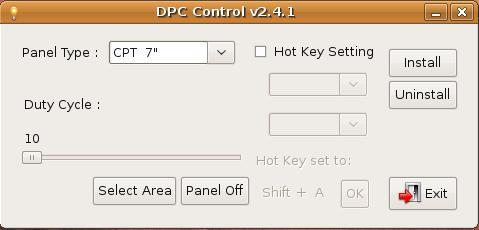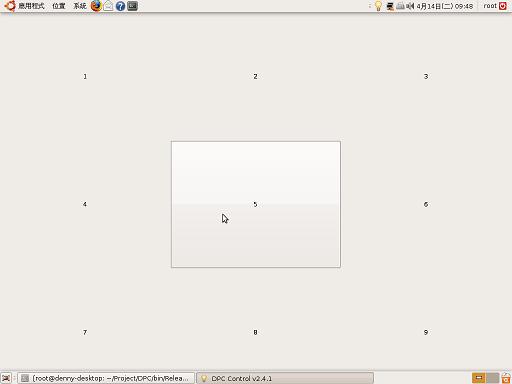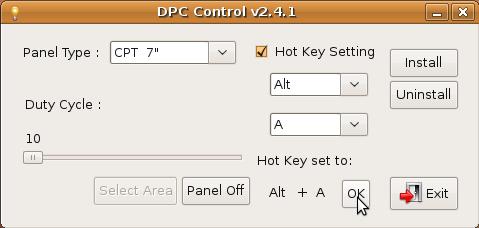請先看『使用說明』
DPC Module:DPC under Linux
From LEXWiKi
| Line 35: | Line 35: | ||
Exit : Exit the program. | Exit : Exit the program. | ||
| - | |||
== Sample Code Introduction == | == Sample Code Introduction == | ||
| - | //---------------------------------------------------------------------------------- | + | 1. Define SMBus register |
| - | #define HST_STS | + | typedef unsigned char BYTE; |
| - | #define HST_CNT | + | typedef unsigned short WORD; |
| - | #define HST_CMD | + | typedef unsigned long DWORD; |
| - | #define XMIT_SLVA 0x04 // SMBus Host Address | + | #define m_SMBusMapIoAddr 0x0500 |
| - | #define HST_D0 | + | //---------------------------------------------------------------------------------- |
| - | //---------------------------------------------------------------------------------- | + | #define HST_STS 0x00 // SMBus Host Status Register Offset |
| - | #define SADD 0xb0 | + | #define HST_CNT 0x02 // SMBus Host Contorl Register Offset |
| - | #define PWMFeq 0x01 | + | #define HST_CMD 0x03 // SMBus Host Command Register Offset |
| - | #define PWMDuty 0x02 | + | #define XMIT_SLVA 0x04 // SMBus Host Address Register Offset |
| + | #define HST_D0 0x05 // SMBus Host Data0 Register Offset | ||
| + | //---------------------------------------------------------------------------------- | ||
| + | #define SADD 0xb0 | ||
| + | #define PWMFeq 0x01 | ||
| + | #define PWMDuty 0x02 | ||
| + | |||
| + | 2. SMBusIoWrite | ||
| + | void SMBusIoWrite(BYTE byteOffset,BYTE byteData) | ||
| + | { | ||
| + | outb( byteData , m_SMBusMapIoAddr + byteOffset); | ||
| + | } | ||
| + | |||
| + | 3. SMBusIoRead | ||
| + | BYTE SMBusIoRead(BYTE byteOffset) | ||
| + | { | ||
| + | DWORD dwAddrVal; | ||
| + | dwAddrVal = inb(m_SMBusMapIoAddr + byteOffset); | ||
| + | return (BYTE)(dwAddrVal & 0x0FF); | ||
| + | } | ||
| + | |||
| + | 4. SetDutyCycle | ||
| + | void SetDutyCycle(gint iDutyValue) | ||
| + | { | ||
| + | DWORD dwPortVal; | ||
| + | SMBusIoWrite(HST_STS, 0xFE); | ||
| + | SMBusIoWrite(XMIT_SLVA, SADD); | ||
| + | SMBusIoWrite(HST_CMD, PWMDuty); | ||
| + | dwPortVal = SMBusIoRead (HST_STS); | ||
| + | dwPortVal = dwPortVal & 0x01; | ||
| + | SMBusIoWrite(HST_D0, iDutyValue); | ||
| + | SMBusIoWrite(HST_CNT, 0x48); | ||
| + | } | ||
| + | |||
| + | 5. SetFrequency | ||
| + | void SetFrequency(gint iFrequency) | ||
| + | { | ||
| + | DWORD dwPortVal; | ||
| + | SMBusIoWrite(HST_STS, 0xFE); | ||
| + | SMBusIoWrite(XMIT_SLVA, SADD); | ||
| + | SMBusIoWrite(HST_CMD, PWMFeq); | ||
| + | dwPortVal = SMBusIoRead (HST_STS); | ||
| + | dwPortVal = dwPortVal & 0x01; | ||
| + | SMBusIoWrite(HST_D0, iFrequency); | ||
| + | SMBusIoWrite(HST_CNT, 0x48); | ||
| + | } | ||
Revision as of 11:03, 14 April 2009
The Sample code source you can download from
Source file: DPCv2.4.1L.tar.gz
Binary file: DPC-binv2.4.1L.tar.gz
How to use this Demo Application
1. execute the ap, it will showed in system bar
2. Content explanation
Panel Type : Select panel what you try to adjust
Duty cycle : Brightness control, from 10 to 100
Select Area : After pressed this button, show another dialog which for you can select an area to light on panel
Panel off : light off the panel, (if you try to light on panel again, just click selected area or hotkey)
Hotkey Setting: Setting hotkey to light on panel, press the "OK" button after setting to completed
Install : Set the system to autorun this application when booting
Uninstall : Remove autorun this application when booting.
Exit : Exit the program.
Sample Code Introduction
1. Define SMBus register
typedef unsigned char BYTE; typedef unsigned short WORD; typedef unsigned long DWORD; #define m_SMBusMapIoAddr 0x0500 //---------------------------------------------------------------------------------- #define HST_STS 0x00 // SMBus Host Status Register Offset #define HST_CNT 0x02 // SMBus Host Contorl Register Offset #define HST_CMD 0x03 // SMBus Host Command Register Offset #define XMIT_SLVA 0x04 // SMBus Host Address Register Offset #define HST_D0 0x05 // SMBus Host Data0 Register Offset //---------------------------------------------------------------------------------- #define SADD 0xb0 #define PWMFeq 0x01 #define PWMDuty 0x02
2. SMBusIoWrite
void SMBusIoWrite(BYTE byteOffset,BYTE byteData)
{
outb( byteData , m_SMBusMapIoAddr + byteOffset);
}
3. SMBusIoRead
BYTE SMBusIoRead(BYTE byteOffset)
{
DWORD dwAddrVal;
dwAddrVal = inb(m_SMBusMapIoAddr + byteOffset);
return (BYTE)(dwAddrVal & 0x0FF);
}
4. SetDutyCycle
void SetDutyCycle(gint iDutyValue)
{
DWORD dwPortVal;
SMBusIoWrite(HST_STS, 0xFE);
SMBusIoWrite(XMIT_SLVA, SADD);
SMBusIoWrite(HST_CMD, PWMDuty);
dwPortVal = SMBusIoRead (HST_STS);
dwPortVal = dwPortVal & 0x01;
SMBusIoWrite(HST_D0, iDutyValue);
SMBusIoWrite(HST_CNT, 0x48);
}
5. SetFrequency
void SetFrequency(gint iFrequency)
{
DWORD dwPortVal;
SMBusIoWrite(HST_STS, 0xFE);
SMBusIoWrite(XMIT_SLVA, SADD);
SMBusIoWrite(HST_CMD, PWMFeq);
dwPortVal = SMBusIoRead (HST_STS);
dwPortVal = dwPortVal & 0x01;
SMBusIoWrite(HST_D0, iFrequency);
SMBusIoWrite(HST_CNT, 0x48);
}



